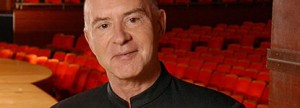
Christoph Eschenbach
German pianist and conductor Christoph Eschenbach returned as guest conductor with the Los Angeles Philharmonic this past weekend to conduct the orchestra in three works: the “Carnival Overture” and the Symphony No. 9 in E minor, Op. 95, “From the New World,” by Bohemian composer Antonin Dvorák, and the Violin Concerto No. 1, Op. 35, by Polish composer Karol Szymanowski.
Eschenbach’s rendition of the “Carnival Overture” on Sunday was faster than I’ve ever heard it; in fact, quite a bit faster than the metronome marking on the score of 132. Eschenbach’s tempo almost taxed the ability of the sting players to keep up. Moreover, what the listener mainly heard in the main theme were the quarter accent notes played by the brass, instead of the melody played by the strings. Then the piece was over without giving the audience time to truly appreciate it. One wonders whether the fast tempo had anything to do with the fact that the concert started almost 15 minutes late.
The Szymanowski featured another German musician, violinist Christian Tetzlaff, who was also making a return appearance with the LA Phil. Although the Szymanowski is beautifully orchestrated, with few if any hints of the Polish nationalism suggested in the program, it isn’t the kind of showcase piece that one usually identifies with the great romantic violin concertos. That’s not to say that Tetzlaff didn’t play it superbly. Also, because the piece is unfamiliar to most listeners, it didn’t get the reception another concerto might have. This was reflected in the audience’s delayed standing ovation, more in appreciation of Tetzlaff’s playing than the concerto itself.
All in all, the first half of Sunday’s concert was less than overwhelming.
The second half of the concert, however, was a different story altogether. Whereas the “Carnival Overture” was played at breakneck speed, the New World Symphony was played with nuances in tempo and dynamics that conveyed the mood of each movement with maximum effectiveness. The slow movement, especially, was hauntingly beautiful. Each of the orchestra’s principals rose to the challenge of his or her respective parts, including Concertmaster Martin Chalifour, William Lane (principal horn), Ariana Ghez (principal oboist), and Carolyn Hove (English horn).
Sometimes, rarely, a piece is performed so well that it seems like it could be the definitive version. Such was the case with Eschenbach’s New World Symphony on Sunday.





